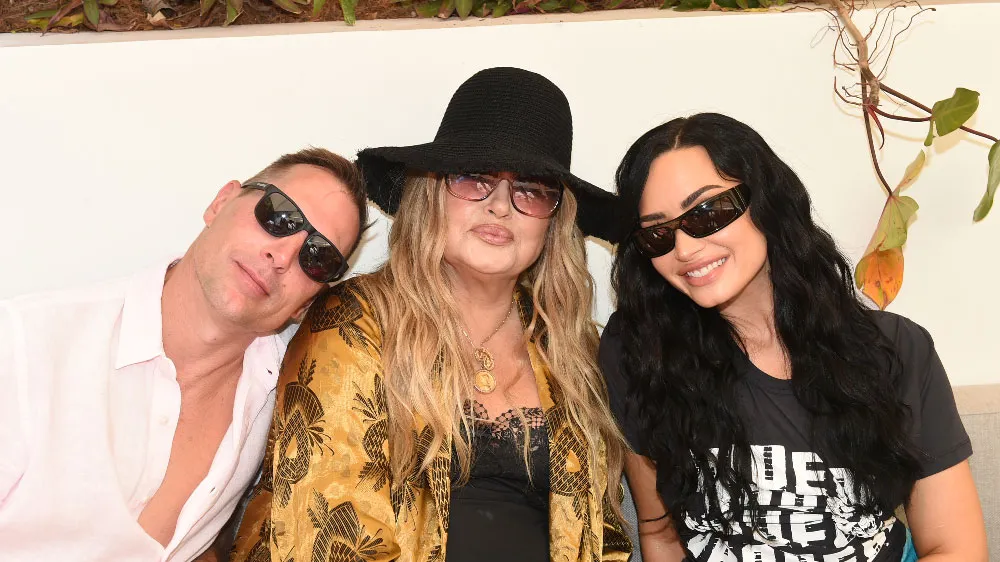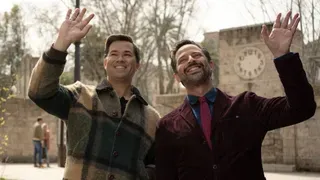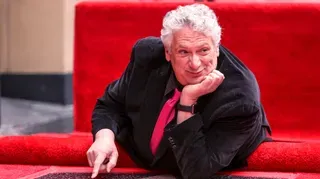June 8, 2013
Alison Moyet Talks 'The Minutes'
Kilian Melloy READ TIME: 6 MIN.
When the name of Alison Moyet is mentioned to some adults of a certain age, the first song lyric to possibly come to mind might be "Please don't stop / Don't you know? / I'm never gonna let you go," from "Don't Go." Yet, after tremendous success with Vince Clarke as the duo Yaz, her solo work as a vocalist only continued to shine as a singer of the first caliber long after "Don't Go," had gone.
She has brought forth ground breaking and emotionally charged songs such as "Love Resurrection," "Invisible" and "All Cried Out," and will always be considered as an important element of the new wave, pop, blues and electronica scene when beginning her journey in 1982. Now, Alison Moyet is musically moving forward as an artist, acknowledging 25 years in the U.K. industry and abroad.
With consistent, relevant and out-of-the-box originality, Moyet might have easily stated, "Happening is not where I want to be. I want to be free to create what is truly mine." With a seven-year itch of this important desire addressed and presented on her terms, Moyet is back with her new album, "The Minutes." In this revealing, heartfelt and thoroughly intelligent interview without a touch of "attitude," Moyet proudly wears the coat of her musical coloring and shares the importance of individuality and creativity.
Will you tell me a bit about what it's been like working on your label Metropolis Records?
It's a new relationship. I met them awhile back. For me, I was just delighted with the fact that they completely got what I wanted to do with this album. I'm actually delighted. For me to get a deal at this point in time was tricky as obviously, a middle-aged woman and all that "blah, blah, blah."
Really?
No one wants you to make new music. They don't want original works from you, you know. That's been my experience in England over the last four years, I've had offers to make covers albums. I turned them down and decided to make this album on my own. Guy Sigsworth and I made it together and then we took it to record labels to see if anyone "got it" without making us change or edit copy. The first main label was Cooking Vinyl England and through their partnership with Metropolis, Metropolis came straight on board. It's been amazing.
Oh, wow. Wonderful, I'm a 1961 baby too.
Ohhh...I love that. I love that.
So, I hear ya all the way.
It's so great of you to have the same reference points isn't it? You know it's a musical journey, so that's really nice.
How did you come about titling the album "The Minutes?" Was the title in any way, a reference to the book "The Hours?"
No, it wasn't at all. In fact, I'll tell you kind of where that reference "the minutes" came from. It comes from a song "Filigree" which was a song that I wrote after going to see the film "The Tree of Life." Remember that film?
Yes.
I went to see "The Tree of Life," it was a rainy weekend afternoon, I was with my husband, and it was sort of like we fell into a cinema. There was a line outside, the people were going in and obviously it's an art house film and these people were leaving in droves. These people looking for mainstream entertainment. You see them go.
We sat there. We were caught by the visual beauty, perplexed by the seeming lack of narrative. But, either way you sit there for almost an hour and you find yourself involved in watching it and moving with the pace. At the same time, you still don't quite understand your experience.
Then, in the last five minutes of the film is a wonderful, redemptive scene, which really kind of sums up what this album ["The Minutes"] means to me. It's like the whole chorus and you jump too soon and that can relate to suicide, that can relate to your relationship; a project that's become tortuous. Anything you fear and you're on your last legs and you jump right before this glorious redemptive minute. The one thing that you understand when you are middle-aged, is that this idea that you're sold on nursery stories when you're young is this "perfect" life and that somehow you fucked up. You've got to continue on... and you fucked up. Then, you get to this brilliant place in your life where you are understood "Oh I see, those glorious times. They happened in pedestrian years. Those minutes were strong in pedestrian years."
And when I understand that, when I stop feeling cheated because of those dull, loveless, gray days, and it's just these times that we're supposed to support. When you understand that, you're in the grade. You're ready for your own misery.
Woah, that's an excellent analogy. You almost made me jump ahead of my questions because my favorite song is "Filigree."
Ohhh...fantastic. Like you said, that sums up what "Minutes" means to me. Not about "The Hours," it means about the facts that within this film ["Tree of Life"] there are a couple of minutes... I enjoyed the film, don't get me wrong but there were a couple of minutes that lifted my heart and made me feel differently.
Nice, that's nice. Will you share a bit and tell me about the time spent with Guy Sigsworth as co-writer and producer?
Yeah, yeah, it was magical. I've wanted to make an electronic album for a long time. I really wanted to use that palette and that light soundscape to be applied in a very different way to when you work with a generic band. It was slightly different in the 1990s where there was a big movement of great melodies. But they didn't seem to have real music nails. Consequently some of these voices were sped up and jammed in and there was a loss of energy to the song. To the point where it was like, "Fuck it now. Instead of being so important to you, fine. But, don't lose your point of reason." It just distracts from everything.
So, looking back at the Yaz era, what was great about that for me, was that Vince still wrote for guitar up and then arranged for electronica. Or, I still write for guitar re-arranged to electronica. That means there was fidelity with the song. In that sense, I wanted someone who has a real musical know-how. I also had an introduction to Guy Sigsworth. I knew some of his work and I wasn't against it because I was interested in his stuff with Talvin Singh and Bj�rk. But, his pop hits wouldn't have bothered me at all. More to the point, I didn't really know his catalogue. I just went along to his meeting so I didn't appear reticent or truculent with my management people who are trying to help me find this person. Being of mind that I am socially inept and find it quite difficult going out... any way (laughter)
Ultimately, I went to meet Guy. His musical journey had started as a harpsichordist at Cambridge University.
Oh my!
His musicianship is actually the supremes. It's glorious. Tie it into this... this wonderful sense of invention and a desire to be constantly looking outside of the sphere that he's in. And by the fact that making music for him is so much more important, making a good piece of music is so much more important than making a chart hit. Guy could work with loads of acts. As far as he was concerned he's chart-riding high, but what he did was believe in me as an artist and as a singer, you know.
So, it's obvious the connection worked.
It's brilliant. We just spoke the same language and it was not a single argument. We never disagreed. We were both these odd characters who were completely settled in what we do. We know set duty with what we do as musicians but we're socially inept... which is perfect. We work so well melodically and lyrically together. That's my arena.
I have to tell you this. The powers that be are sending music now just for computer. This doesn't work for me. I have shitty speakers right now. So, I honestly can't wait to hear the album on my Yamahas outside on our back patio. We work so well together melodically and lyrically, that's my arena.
Yeaaah... that will be amazing.
Can't wait. What a pleasure talking with you. You are a beauty with an edge.
Thank you so much. Love and happiness to you. Take care.
Kilian Melloy serves as EDGE Media Network's Associate Arts Editor and Staff Contributor. His professional memberships include the National Lesbian & Gay Journalists Association, the Boston Online Film Critics Association, The Gay and Lesbian Entertainment Critics Association, and the Boston Theater Critics Association's Elliot Norton Awards Committee.

 Copyright Rage Monthly. For more articles from Rage visit
Copyright Rage Monthly. For more articles from Rage visit 





